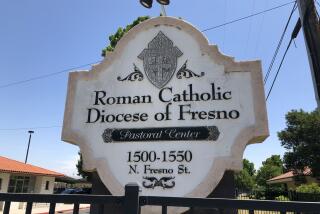Priesthood Plays in Peoria as Recruiting Thrives : Clergy: Diocese has ordained more men in the last year than dioceses 10 times its size. Much of the credit goes to a conservative bishop who cultivates aspiring priests.
- Share via
PEORIA, Ill. — The Roman Catholic Diocese is defying the national trend that shows the number of priests in a steady decline. In the last year, the diocese ordained 13 priests, a number that ranks it among archdioceses 10 times its size.
Peoria is “clearly an aberration,” said Lawrence Young, a Brigham Young University sociologist who has studied Catholic seminary and ordination trends.
The situation in Peoria may be highly unusual in the church today. It is the result of the very deliberate cultivation of priest candidates by Bishop John J. Myers, who served as vocation director of the diocese for 10 years before his elevation to bishop in January, 1990.
Interviews with the seven new priests who came from out of state to Peoria during the last year show that the large number of ordinations is also due to their agreement with Myers’ staunch conservatism and to the attention the bishop lavishes on new priests.
This year, for instance, the 50-year-old bishop took time to dine with the seminarians the night before their ordination and said the Rosary with them before the ceremony the next day.
“In Bishop Myers, we have a man who cares about and truly loves the men studying for his diocese,” said one of the newly ordained men, Father Philip D. Halfacre, 26, of Hammond, Ind. “Peoria is not some sort of bureaucratic shop. The candidate feels he is becoming part of a family.”
Halfacre said he was urged by a priest of his previous diocese to apply to Peoria. “The word gets out about how you are treated.”
Myers has already instituted a range of changes in his diocese that have cast him in some quarters of the church as an aggressive new standard-bearer for conservative causes. Many experts studying the priesthood report that there is a kind of malaise that priests say results from a loss of prestige, a lack of professional reward and a lack of contact with the chief decision-makers, the bishop of each diocese.
There is more to the allure of Peoria than a warm welcome. The priests coming from out of state, for example, appeared to be in complete agreement with Myers’ vision of what the church is about and how it should be run.
Some of them attended extremely conservative Catholic institutions. Others attended seminaries and institutes that, though more moderate, are known for their orthodoxy.
Young, the scholar who has tracked the decline of the priesthood in the United States, said Peoria may represent more a victory of recruiting than of inspiring new vocations.
He said surveys have shown that younger priests are more conservative than their elders. In the national marketplace, then, Myers’ new priests would have been priests in any case, but they chose to go to Peoria.
No one knows if this reallocation of priests will continue. Peoria, with 243,400 Catholics, ordained 13 priests in the last few months, 11 in the spring and two in December.
Chicago, by comparison, has 2.4 million Catholics and reported ordaining 14 priests this year; New York, with 2.2 million, ordained 13; Boston, with 1.9 million, ordained 13; and Los Angeles, the largest diocese in the United States with 3.4 million Catholics, ordained 12.
Those dioceses are hardly liberal outposts, and some have reputations for being led by very conservative churchmen. So why would someone not opt for New York or Los Angeles instead of Peoria?
Former Navy officer and Annapolis graduate Stuart W. Swetland, 32, of Myrtle Beach, S.C., said his search for a diocese stopped when he attended a retreat given by Myers. “Once I heard him, I knew,” said Swetland, who converted to Catholicism from the Lutheran Church-Missouri Synod while studying at Oxford University, England, as a Rhodes scholar.
He said that the goal of his search for a diocese was to reconcile Catholic Church certainty in areas of doctrine with Vatican II changes. In Myers, he found a clarity and lack of ambiguity that were not always present in his seminary studies, he said.
Contact with Myers was the reason another young priest, Father Dominick J. Vitaliano Jr. of Miami, opted for Peoria. Referring to Myers and his outspoken opposition to abortion and pastoral writings on other church issues, he said: “He’s not going to compromise on Catholic doctrine. That’s what a good bishop is about.”
More to Read
Sign up for Essential California
The most important California stories and recommendations in your inbox every morning.
You may occasionally receive promotional content from the Los Angeles Times.













